Comprehensive Report: English Legal System and Business Law Framework
VerifiedAdded on 2023/01/03
|10
|2910
|25
Report
AI Summary
This report provides a comprehensive overview of the English legal system and its impact on business operations. It begins by tracing the evolution of law, discussing the sources of law including legislation, common law, and international law. The report then delves into key areas of business law, such as contract law, competition law, healthcare issues, privacy regulations, and employment law. It examines the legal structures available for businesses, including sole proprietorships, partnerships, and limited companies, outlining their characteristics, liabilities, and regulatory requirements. Furthermore, the report explores the process of company incorporation, including the roles of directors, shareholders, and the procedures for public listing and liquidation. Finally, the report touches upon the broad application of contract law in daily life, including the doctrine of frustration and the ability to make waivers in difficult situations, offering a practical understanding of how the legal framework shapes business practices and operations within the UK.
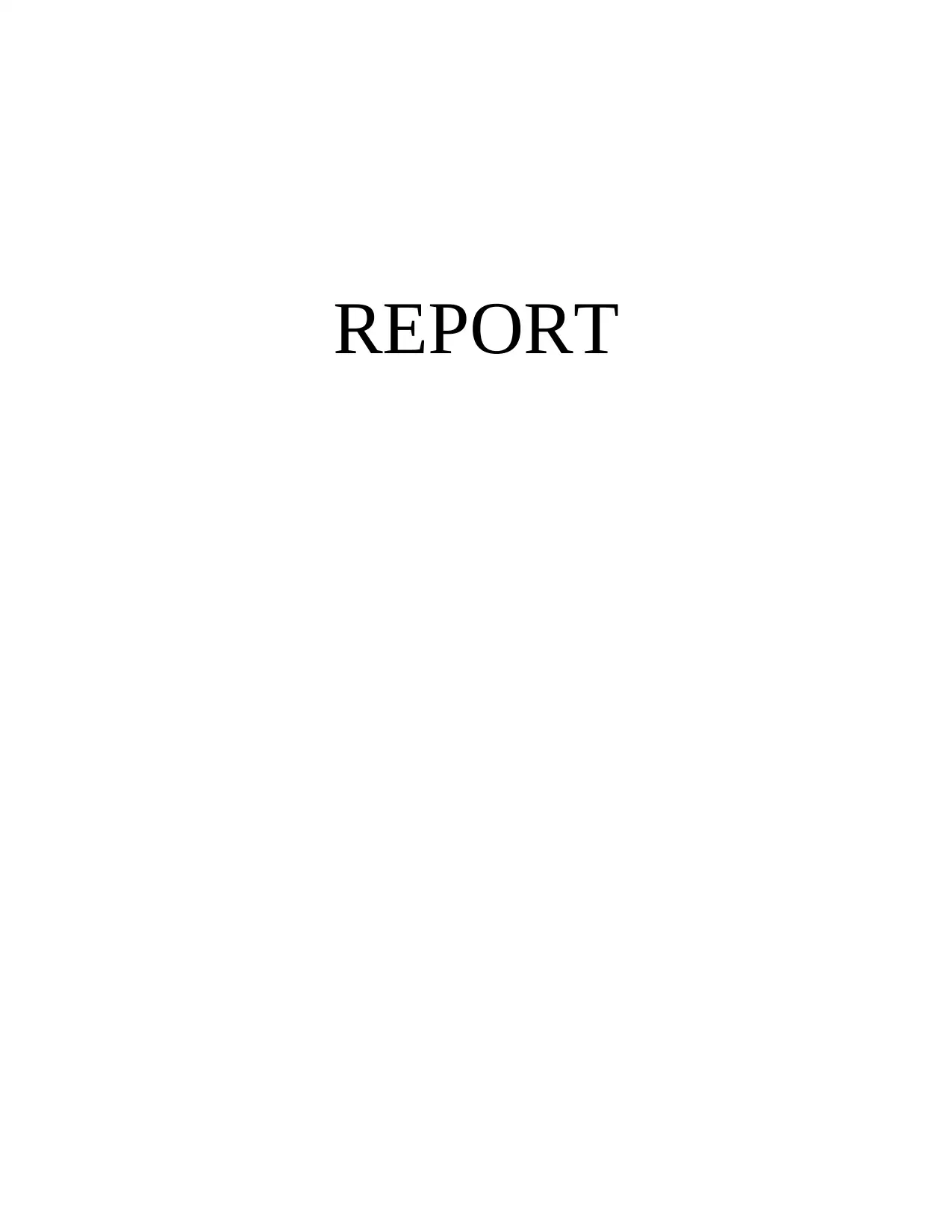
REPORT
Paraphrase This Document
Need a fresh take? Get an instant paraphrase of this document with our AI Paraphraser
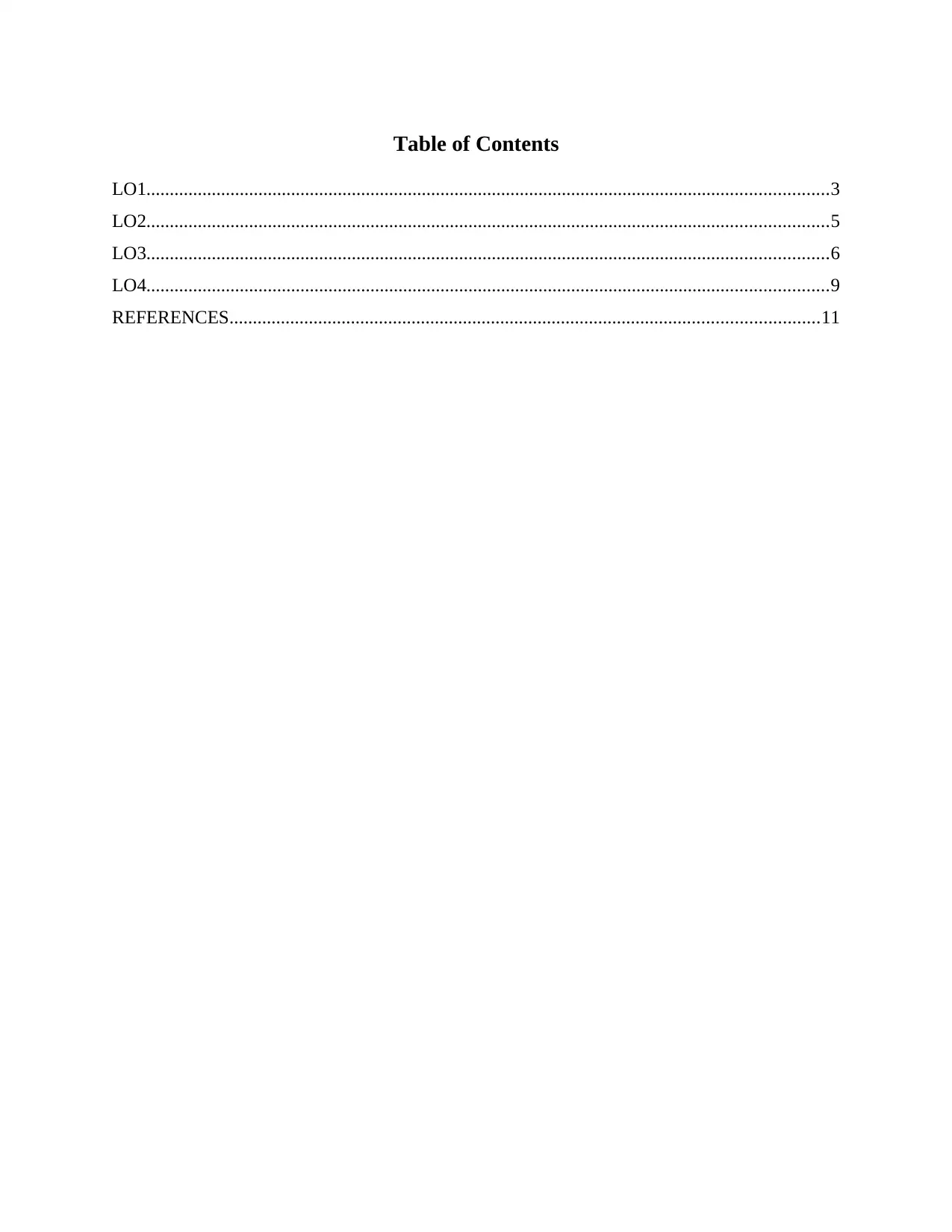
Table of Contents
LO1..................................................................................................................................................3
LO2..................................................................................................................................................5
LO3..................................................................................................................................................6
LO4..................................................................................................................................................9
REFERENCES..............................................................................................................................11
LO1..................................................................................................................................................3
LO2..................................................................................................................................................5
LO3..................................................................................................................................................6
LO4..................................................................................................................................................9
REFERENCES..............................................................................................................................11
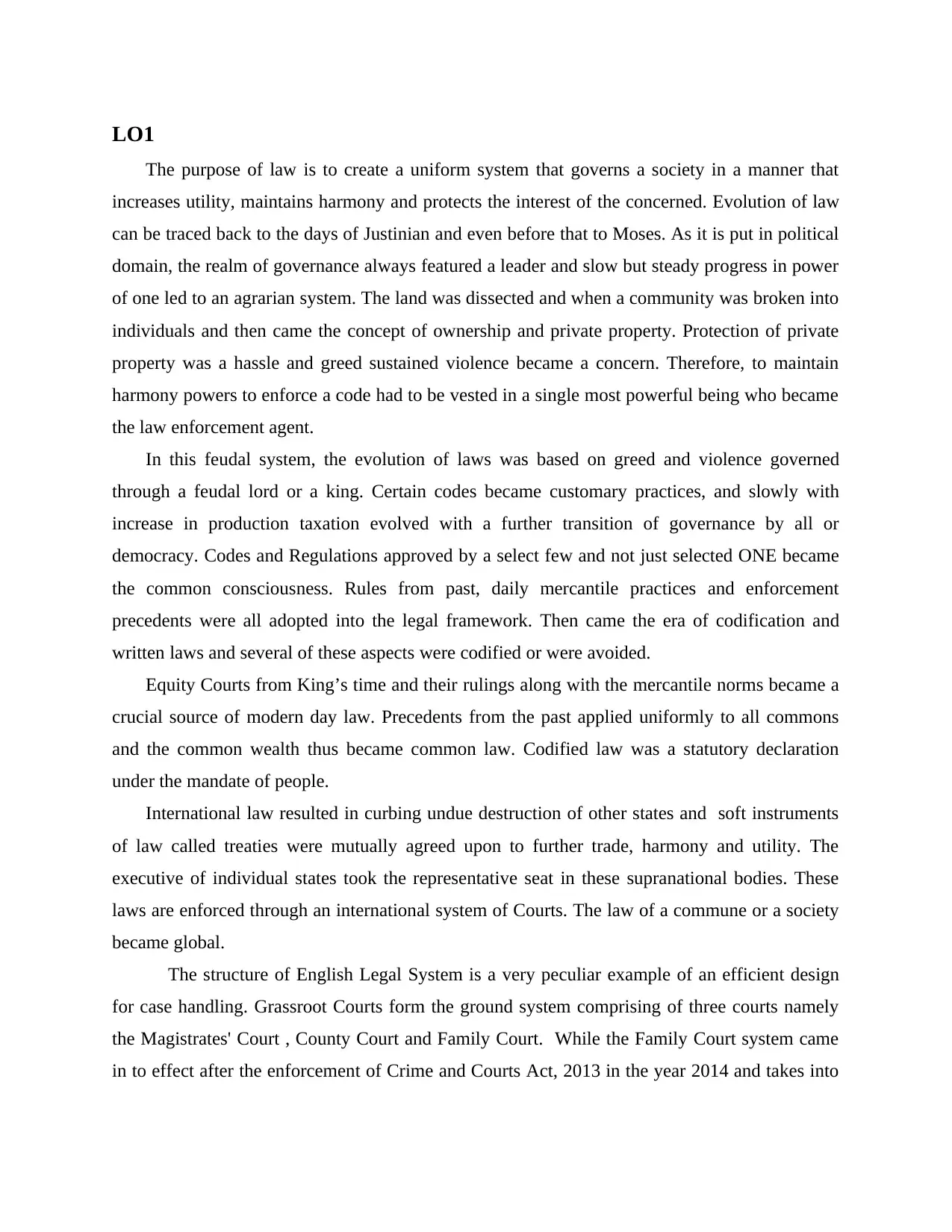
LO1
The purpose of law is to create a uniform system that governs a society in a manner that
increases utility, maintains harmony and protects the interest of the concerned. Evolution of law
can be traced back to the days of Justinian and even before that to Moses. As it is put in political
domain, the realm of governance always featured a leader and slow but steady progress in power
of one led to an agrarian system. The land was dissected and when a community was broken into
individuals and then came the concept of ownership and private property. Protection of private
property was a hassle and greed sustained violence became a concern. Therefore, to maintain
harmony powers to enforce a code had to be vested in a single most powerful being who became
the law enforcement agent.
In this feudal system, the evolution of laws was based on greed and violence governed
through a feudal lord or a king. Certain codes became customary practices, and slowly with
increase in production taxation evolved with a further transition of governance by all or
democracy. Codes and Regulations approved by a select few and not just selected ONE became
the common consciousness. Rules from past, daily mercantile practices and enforcement
precedents were all adopted into the legal framework. Then came the era of codification and
written laws and several of these aspects were codified or were avoided.
Equity Courts from King’s time and their rulings along with the mercantile norms became a
crucial source of modern day law. Precedents from the past applied uniformly to all commons
and the common wealth thus became common law. Codified law was a statutory declaration
under the mandate of people.
International law resulted in curbing undue destruction of other states and soft instruments
of law called treaties were mutually agreed upon to further trade, harmony and utility. The
executive of individual states took the representative seat in these supranational bodies. These
laws are enforced through an international system of Courts. The law of a commune or a society
became global.
The structure of English Legal System is a very peculiar example of an efficient design
for case handling. Grassroot Courts form the ground system comprising of three courts namely
the Magistrates' Court , County Court and Family Court. While the Family Court system came
in to effect after the enforcement of Crime and Courts Act, 2013 in the year 2014 and takes into
The purpose of law is to create a uniform system that governs a society in a manner that
increases utility, maintains harmony and protects the interest of the concerned. Evolution of law
can be traced back to the days of Justinian and even before that to Moses. As it is put in political
domain, the realm of governance always featured a leader and slow but steady progress in power
of one led to an agrarian system. The land was dissected and when a community was broken into
individuals and then came the concept of ownership and private property. Protection of private
property was a hassle and greed sustained violence became a concern. Therefore, to maintain
harmony powers to enforce a code had to be vested in a single most powerful being who became
the law enforcement agent.
In this feudal system, the evolution of laws was based on greed and violence governed
through a feudal lord or a king. Certain codes became customary practices, and slowly with
increase in production taxation evolved with a further transition of governance by all or
democracy. Codes and Regulations approved by a select few and not just selected ONE became
the common consciousness. Rules from past, daily mercantile practices and enforcement
precedents were all adopted into the legal framework. Then came the era of codification and
written laws and several of these aspects were codified or were avoided.
Equity Courts from King’s time and their rulings along with the mercantile norms became a
crucial source of modern day law. Precedents from the past applied uniformly to all commons
and the common wealth thus became common law. Codified law was a statutory declaration
under the mandate of people.
International law resulted in curbing undue destruction of other states and soft instruments
of law called treaties were mutually agreed upon to further trade, harmony and utility. The
executive of individual states took the representative seat in these supranational bodies. These
laws are enforced through an international system of Courts. The law of a commune or a society
became global.
The structure of English Legal System is a very peculiar example of an efficient design
for case handling. Grassroot Courts form the ground system comprising of three courts namely
the Magistrates' Court , County Court and Family Court. While the Family Court system came
in to effect after the enforcement of Crime and Courts Act, 2013 in the year 2014 and takes into
⊘ This is a preview!⊘
Do you want full access?
Subscribe today to unlock all pages.

Trusted by 1+ million students worldwide
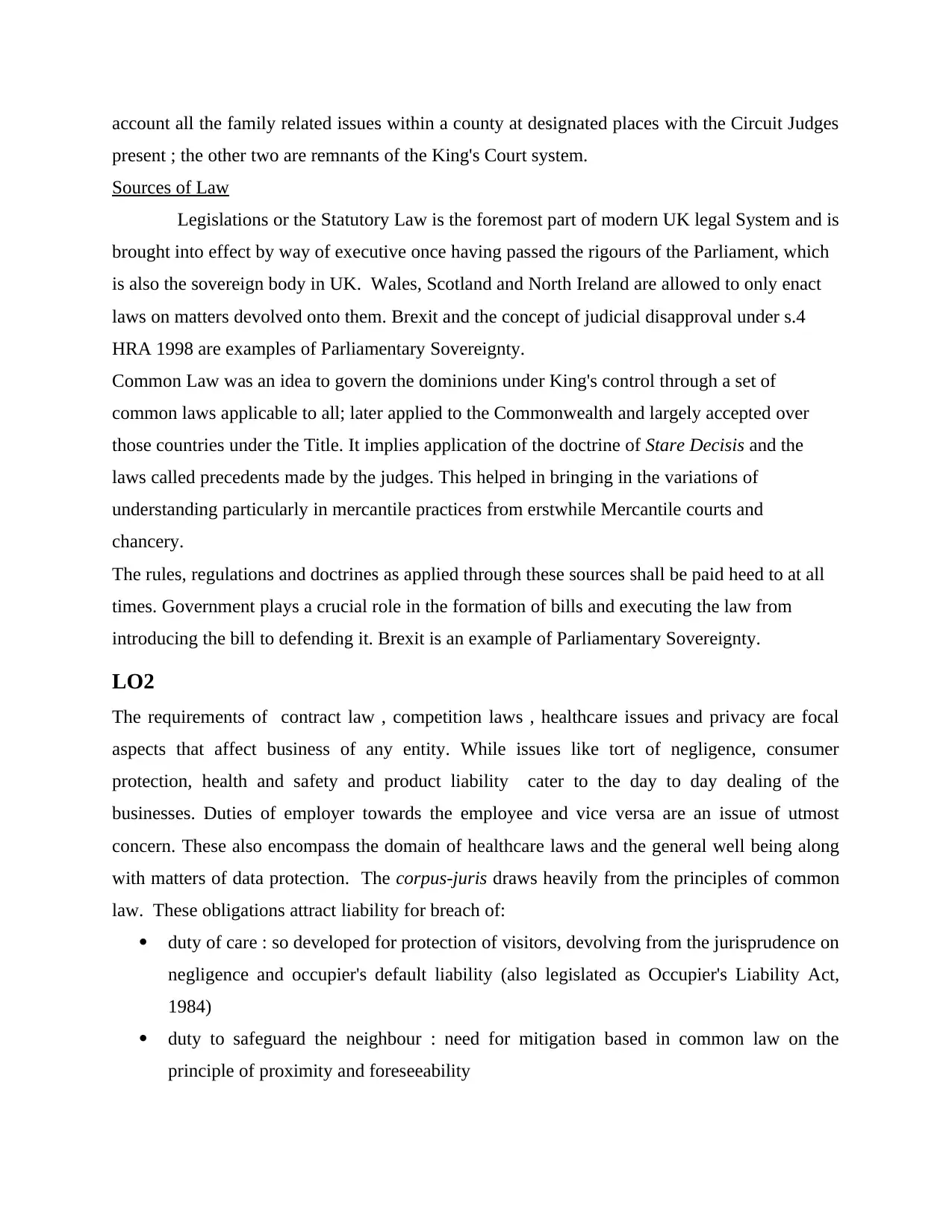
account all the family related issues within a county at designated places with the Circuit Judges
present ; the other two are remnants of the King's Court system.
Sources of Law
Legislations or the Statutory Law is the foremost part of modern UK legal System and is
brought into effect by way of executive once having passed the rigours of the Parliament, which
is also the sovereign body in UK. Wales, Scotland and North Ireland are allowed to only enact
laws on matters devolved onto them. Brexit and the concept of judicial disapproval under s.4
HRA 1998 are examples of Parliamentary Sovereignty.
Common Law was an idea to govern the dominions under King's control through a set of
common laws applicable to all; later applied to the Commonwealth and largely accepted over
those countries under the Title. It implies application of the doctrine of Stare Decisis and the
laws called precedents made by the judges. This helped in bringing in the variations of
understanding particularly in mercantile practices from erstwhile Mercantile courts and
chancery.
The rules, regulations and doctrines as applied through these sources shall be paid heed to at all
times. Government plays a crucial role in the formation of bills and executing the law from
introducing the bill to defending it. Brexit is an example of Parliamentary Sovereignty.
LO2
The requirements of contract law , competition laws , healthcare issues and privacy are focal
aspects that affect business of any entity. While issues like tort of negligence, consumer
protection, health and safety and product liability cater to the day to day dealing of the
businesses. Duties of employer towards the employee and vice versa are an issue of utmost
concern. These also encompass the domain of healthcare laws and the general well being along
with matters of data protection. The corpus-juris draws heavily from the principles of common
law. These obligations attract liability for breach of:
duty of care : so developed for protection of visitors, devolving from the jurisprudence on
negligence and occupier's default liability (also legislated as Occupier's Liability Act,
1984)
duty to safeguard the neighbour : need for mitigation based in common law on the
principle of proximity and foreseeability
present ; the other two are remnants of the King's Court system.
Sources of Law
Legislations or the Statutory Law is the foremost part of modern UK legal System and is
brought into effect by way of executive once having passed the rigours of the Parliament, which
is also the sovereign body in UK. Wales, Scotland and North Ireland are allowed to only enact
laws on matters devolved onto them. Brexit and the concept of judicial disapproval under s.4
HRA 1998 are examples of Parliamentary Sovereignty.
Common Law was an idea to govern the dominions under King's control through a set of
common laws applicable to all; later applied to the Commonwealth and largely accepted over
those countries under the Title. It implies application of the doctrine of Stare Decisis and the
laws called precedents made by the judges. This helped in bringing in the variations of
understanding particularly in mercantile practices from erstwhile Mercantile courts and
chancery.
The rules, regulations and doctrines as applied through these sources shall be paid heed to at all
times. Government plays a crucial role in the formation of bills and executing the law from
introducing the bill to defending it. Brexit is an example of Parliamentary Sovereignty.
LO2
The requirements of contract law , competition laws , healthcare issues and privacy are focal
aspects that affect business of any entity. While issues like tort of negligence, consumer
protection, health and safety and product liability cater to the day to day dealing of the
businesses. Duties of employer towards the employee and vice versa are an issue of utmost
concern. These also encompass the domain of healthcare laws and the general well being along
with matters of data protection. The corpus-juris draws heavily from the principles of common
law. These obligations attract liability for breach of:
duty of care : so developed for protection of visitors, devolving from the jurisprudence on
negligence and occupier's default liability (also legislated as Occupier's Liability Act,
1984)
duty to safeguard the neighbour : need for mitigation based in common law on the
principle of proximity and foreseeability
Paraphrase This Document
Need a fresh take? Get an instant paraphrase of this document with our AI Paraphraser
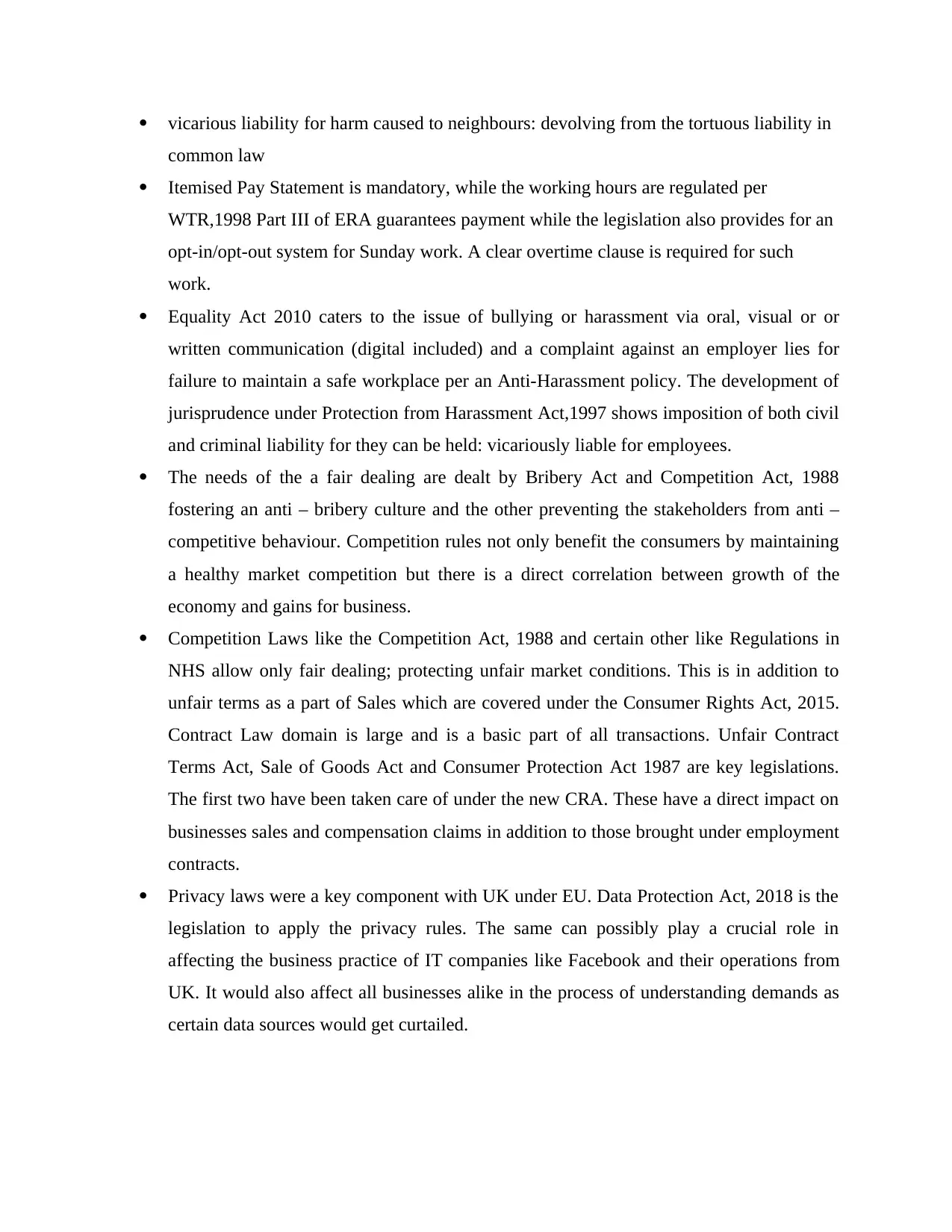
vicarious liability for harm caused to neighbours: devolving from the tortuous liability in
common law
Itemised Pay Statement is mandatory, while the working hours are regulated per
WTR,1998 Part III of ERA guarantees payment while the legislation also provides for an
opt-in/opt-out system for Sunday work. A clear overtime clause is required for such
work.
Equality Act 2010 caters to the issue of bullying or harassment via oral, visual or or
written communication (digital included) and a complaint against an employer lies for
failure to maintain a safe workplace per an Anti-Harassment policy. The development of
jurisprudence under Protection from Harassment Act,1997 shows imposition of both civil
and criminal liability for they can be held: vicariously liable for employees.
The needs of the a fair dealing are dealt by Bribery Act and Competition Act, 1988
fostering an anti – bribery culture and the other preventing the stakeholders from anti –
competitive behaviour. Competition rules not only benefit the consumers by maintaining
a healthy market competition but there is a direct correlation between growth of the
economy and gains for business.
Competition Laws like the Competition Act, 1988 and certain other like Regulations in
NHS allow only fair dealing; protecting unfair market conditions. This is in addition to
unfair terms as a part of Sales which are covered under the Consumer Rights Act, 2015.
Contract Law domain is large and is a basic part of all transactions. Unfair Contract
Terms Act, Sale of Goods Act and Consumer Protection Act 1987 are key legislations.
The first two have been taken care of under the new CRA. These have a direct impact on
businesses sales and compensation claims in addition to those brought under employment
contracts.
Privacy laws were a key component with UK under EU. Data Protection Act, 2018 is the
legislation to apply the privacy rules. The same can possibly play a crucial role in
affecting the business practice of IT companies like Facebook and their operations from
UK. It would also affect all businesses alike in the process of understanding demands as
certain data sources would get curtailed.
common law
Itemised Pay Statement is mandatory, while the working hours are regulated per
WTR,1998 Part III of ERA guarantees payment while the legislation also provides for an
opt-in/opt-out system for Sunday work. A clear overtime clause is required for such
work.
Equality Act 2010 caters to the issue of bullying or harassment via oral, visual or or
written communication (digital included) and a complaint against an employer lies for
failure to maintain a safe workplace per an Anti-Harassment policy. The development of
jurisprudence under Protection from Harassment Act,1997 shows imposition of both civil
and criminal liability for they can be held: vicariously liable for employees.
The needs of the a fair dealing are dealt by Bribery Act and Competition Act, 1988
fostering an anti – bribery culture and the other preventing the stakeholders from anti –
competitive behaviour. Competition rules not only benefit the consumers by maintaining
a healthy market competition but there is a direct correlation between growth of the
economy and gains for business.
Competition Laws like the Competition Act, 1988 and certain other like Regulations in
NHS allow only fair dealing; protecting unfair market conditions. This is in addition to
unfair terms as a part of Sales which are covered under the Consumer Rights Act, 2015.
Contract Law domain is large and is a basic part of all transactions. Unfair Contract
Terms Act, Sale of Goods Act and Consumer Protection Act 1987 are key legislations.
The first two have been taken care of under the new CRA. These have a direct impact on
businesses sales and compensation claims in addition to those brought under employment
contracts.
Privacy laws were a key component with UK under EU. Data Protection Act, 2018 is the
legislation to apply the privacy rules. The same can possibly play a crucial role in
affecting the business practice of IT companies like Facebook and their operations from
UK. It would also affect all businesses alike in the process of understanding demands as
certain data sources would get curtailed.
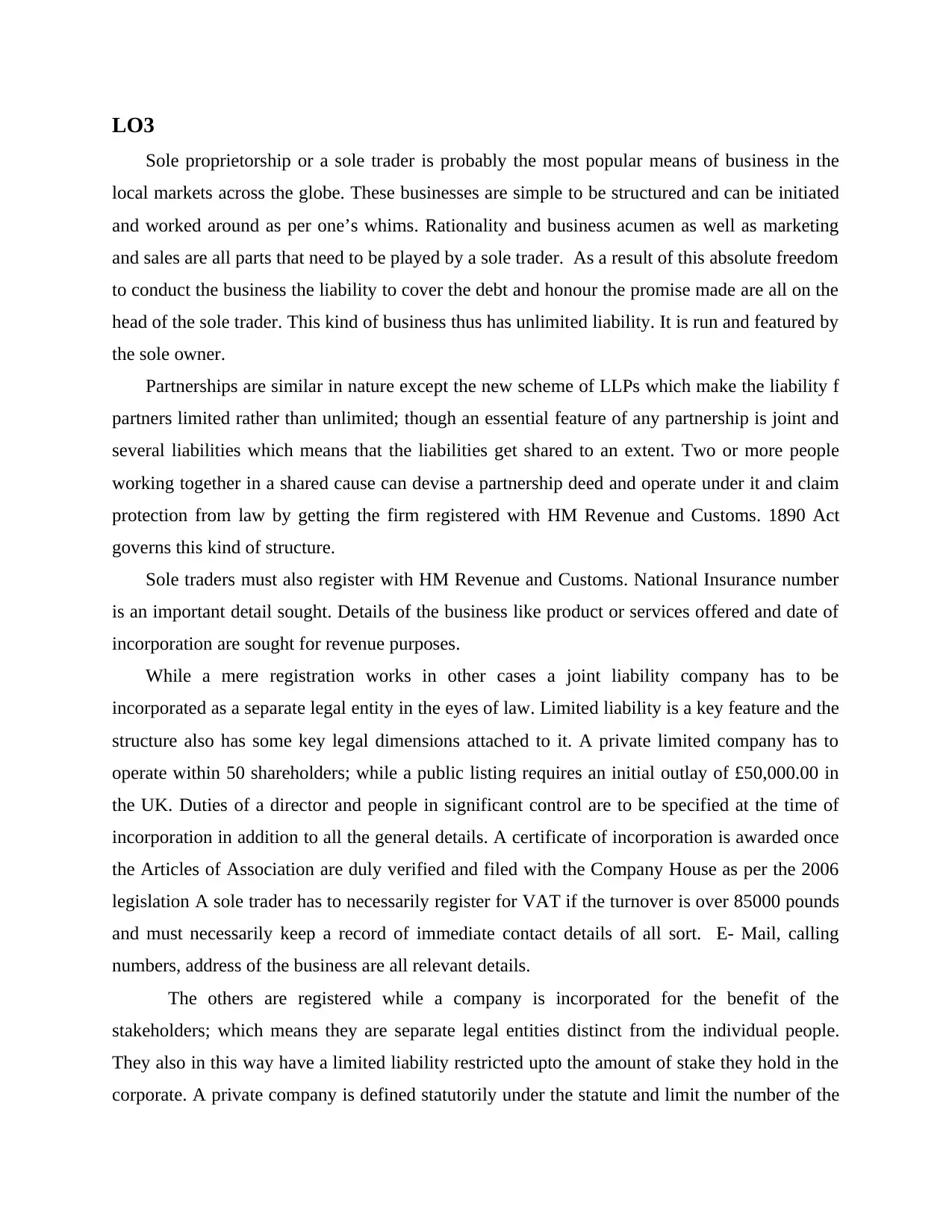
LO3
Sole proprietorship or a sole trader is probably the most popular means of business in the
local markets across the globe. These businesses are simple to be structured and can be initiated
and worked around as per one’s whims. Rationality and business acumen as well as marketing
and sales are all parts that need to be played by a sole trader. As a result of this absolute freedom
to conduct the business the liability to cover the debt and honour the promise made are all on the
head of the sole trader. This kind of business thus has unlimited liability. It is run and featured by
the sole owner.
Partnerships are similar in nature except the new scheme of LLPs which make the liability f
partners limited rather than unlimited; though an essential feature of any partnership is joint and
several liabilities which means that the liabilities get shared to an extent. Two or more people
working together in a shared cause can devise a partnership deed and operate under it and claim
protection from law by getting the firm registered with HM Revenue and Customs. 1890 Act
governs this kind of structure.
Sole traders must also register with HM Revenue and Customs. National Insurance number
is an important detail sought. Details of the business like product or services offered and date of
incorporation are sought for revenue purposes.
While a mere registration works in other cases a joint liability company has to be
incorporated as a separate legal entity in the eyes of law. Limited liability is a key feature and the
structure also has some key legal dimensions attached to it. A private limited company has to
operate within 50 shareholders; while a public listing requires an initial outlay of £50,000.00 in
the UK. Duties of a director and people in significant control are to be specified at the time of
incorporation in addition to all the general details. A certificate of incorporation is awarded once
the Articles of Association are duly verified and filed with the Company House as per the 2006
legislation A sole trader has to necessarily register for VAT if the turnover is over 85000 pounds
and must necessarily keep a record of immediate contact details of all sort. E- Mail, calling
numbers, address of the business are all relevant details.
The others are registered while a company is incorporated for the benefit of the
stakeholders; which means they are separate legal entities distinct from the individual people.
They also in this way have a limited liability restricted upto the amount of stake they hold in the
corporate. A private company is defined statutorily under the statute and limit the number of the
Sole proprietorship or a sole trader is probably the most popular means of business in the
local markets across the globe. These businesses are simple to be structured and can be initiated
and worked around as per one’s whims. Rationality and business acumen as well as marketing
and sales are all parts that need to be played by a sole trader. As a result of this absolute freedom
to conduct the business the liability to cover the debt and honour the promise made are all on the
head of the sole trader. This kind of business thus has unlimited liability. It is run and featured by
the sole owner.
Partnerships are similar in nature except the new scheme of LLPs which make the liability f
partners limited rather than unlimited; though an essential feature of any partnership is joint and
several liabilities which means that the liabilities get shared to an extent. Two or more people
working together in a shared cause can devise a partnership deed and operate under it and claim
protection from law by getting the firm registered with HM Revenue and Customs. 1890 Act
governs this kind of structure.
Sole traders must also register with HM Revenue and Customs. National Insurance number
is an important detail sought. Details of the business like product or services offered and date of
incorporation are sought for revenue purposes.
While a mere registration works in other cases a joint liability company has to be
incorporated as a separate legal entity in the eyes of law. Limited liability is a key feature and the
structure also has some key legal dimensions attached to it. A private limited company has to
operate within 50 shareholders; while a public listing requires an initial outlay of £50,000.00 in
the UK. Duties of a director and people in significant control are to be specified at the time of
incorporation in addition to all the general details. A certificate of incorporation is awarded once
the Articles of Association are duly verified and filed with the Company House as per the 2006
legislation A sole trader has to necessarily register for VAT if the turnover is over 85000 pounds
and must necessarily keep a record of immediate contact details of all sort. E- Mail, calling
numbers, address of the business are all relevant details.
The others are registered while a company is incorporated for the benefit of the
stakeholders; which means they are separate legal entities distinct from the individual people.
They also in this way have a limited liability restricted upto the amount of stake they hold in the
corporate. A private company is defined statutorily under the statute and limit the number of the
⊘ This is a preview!⊘
Do you want full access?
Subscribe today to unlock all pages.

Trusted by 1+ million students worldwide
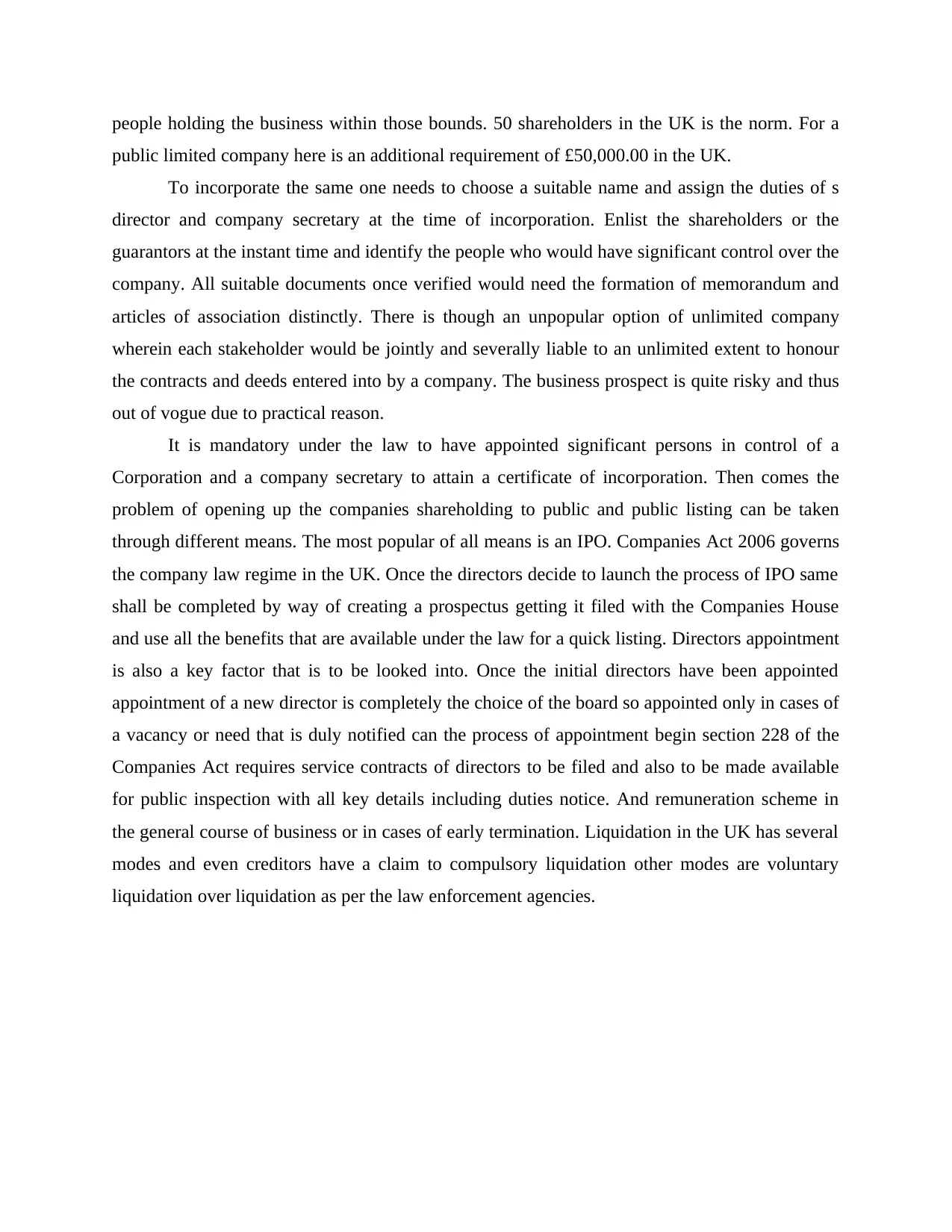
people holding the business within those bounds. 50 shareholders in the UK is the norm. For a
public limited company here is an additional requirement of £50,000.00 in the UK.
To incorporate the same one needs to choose a suitable name and assign the duties of s
director and company secretary at the time of incorporation. Enlist the shareholders or the
guarantors at the instant time and identify the people who would have significant control over the
company. All suitable documents once verified would need the formation of memorandum and
articles of association distinctly. There is though an unpopular option of unlimited company
wherein each stakeholder would be jointly and severally liable to an unlimited extent to honour
the contracts and deeds entered into by a company. The business prospect is quite risky and thus
out of vogue due to practical reason.
It is mandatory under the law to have appointed significant persons in control of a
Corporation and a company secretary to attain a certificate of incorporation. Then comes the
problem of opening up the companies shareholding to public and public listing can be taken
through different means. The most popular of all means is an IPO. Companies Act 2006 governs
the company law regime in the UK. Once the directors decide to launch the process of IPO same
shall be completed by way of creating a prospectus getting it filed with the Companies House
and use all the benefits that are available under the law for a quick listing. Directors appointment
is also a key factor that is to be looked into. Once the initial directors have been appointed
appointment of a new director is completely the choice of the board so appointed only in cases of
a vacancy or need that is duly notified can the process of appointment begin section 228 of the
Companies Act requires service contracts of directors to be filed and also to be made available
for public inspection with all key details including duties notice. And remuneration scheme in
the general course of business or in cases of early termination. Liquidation in the UK has several
modes and even creditors have a claim to compulsory liquidation other modes are voluntary
liquidation over liquidation as per the law enforcement agencies.
public limited company here is an additional requirement of £50,000.00 in the UK.
To incorporate the same one needs to choose a suitable name and assign the duties of s
director and company secretary at the time of incorporation. Enlist the shareholders or the
guarantors at the instant time and identify the people who would have significant control over the
company. All suitable documents once verified would need the formation of memorandum and
articles of association distinctly. There is though an unpopular option of unlimited company
wherein each stakeholder would be jointly and severally liable to an unlimited extent to honour
the contracts and deeds entered into by a company. The business prospect is quite risky and thus
out of vogue due to practical reason.
It is mandatory under the law to have appointed significant persons in control of a
Corporation and a company secretary to attain a certificate of incorporation. Then comes the
problem of opening up the companies shareholding to public and public listing can be taken
through different means. The most popular of all means is an IPO. Companies Act 2006 governs
the company law regime in the UK. Once the directors decide to launch the process of IPO same
shall be completed by way of creating a prospectus getting it filed with the Companies House
and use all the benefits that are available under the law for a quick listing. Directors appointment
is also a key factor that is to be looked into. Once the initial directors have been appointed
appointment of a new director is completely the choice of the board so appointed only in cases of
a vacancy or need that is duly notified can the process of appointment begin section 228 of the
Companies Act requires service contracts of directors to be filed and also to be made available
for public inspection with all key details including duties notice. And remuneration scheme in
the general course of business or in cases of early termination. Liquidation in the UK has several
modes and even creditors have a claim to compulsory liquidation other modes are voluntary
liquidation over liquidation as per the law enforcement agencies.
Paraphrase This Document
Need a fresh take? Get an instant paraphrase of this document with our AI Paraphraser
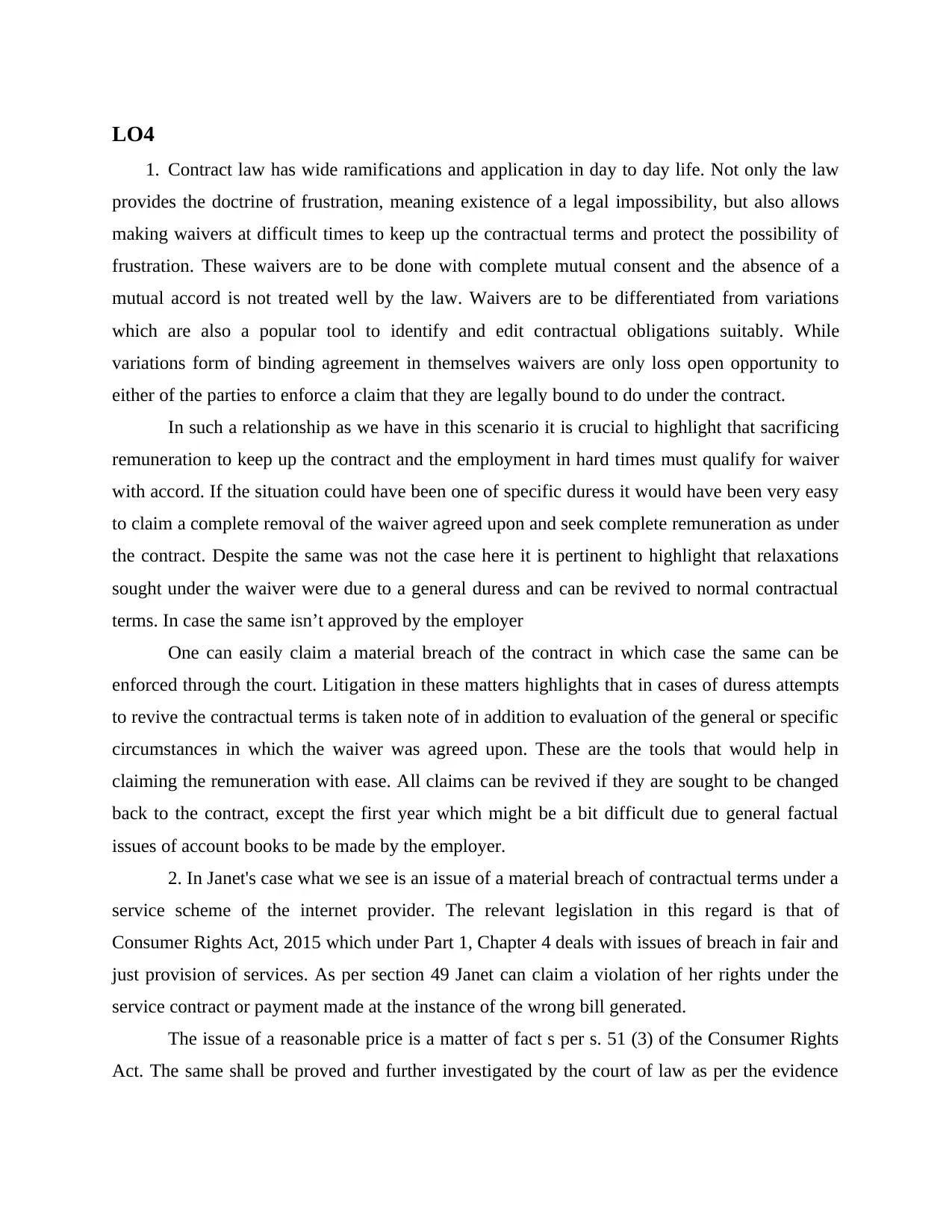
LO4
1. Contract law has wide ramifications and application in day to day life. Not only the law
provides the doctrine of frustration, meaning existence of a legal impossibility, but also allows
making waivers at difficult times to keep up the contractual terms and protect the possibility of
frustration. These waivers are to be done with complete mutual consent and the absence of a
mutual accord is not treated well by the law. Waivers are to be differentiated from variations
which are also a popular tool to identify and edit contractual obligations suitably. While
variations form of binding agreement in themselves waivers are only loss open opportunity to
either of the parties to enforce a claim that they are legally bound to do under the contract.
In such a relationship as we have in this scenario it is crucial to highlight that sacrificing
remuneration to keep up the contract and the employment in hard times must qualify for waiver
with accord. If the situation could have been one of specific duress it would have been very easy
to claim a complete removal of the waiver agreed upon and seek complete remuneration as under
the contract. Despite the same was not the case here it is pertinent to highlight that relaxations
sought under the waiver were due to a general duress and can be revived to normal contractual
terms. In case the same isn’t approved by the employer
One can easily claim a material breach of the contract in which case the same can be
enforced through the court. Litigation in these matters highlights that in cases of duress attempts
to revive the contractual terms is taken note of in addition to evaluation of the general or specific
circumstances in which the waiver was agreed upon. These are the tools that would help in
claiming the remuneration with ease. All claims can be revived if they are sought to be changed
back to the contract, except the first year which might be a bit difficult due to general factual
issues of account books to be made by the employer.
2. In Janet's case what we see is an issue of a material breach of contractual terms under a
service scheme of the internet provider. The relevant legislation in this regard is that of
Consumer Rights Act, 2015 which under Part 1, Chapter 4 deals with issues of breach in fair and
just provision of services. As per section 49 Janet can claim a violation of her rights under the
service contract or payment made at the instance of the wrong bill generated.
The issue of a reasonable price is a matter of fact s per s. 51 (3) of the Consumer Rights
Act. The same shall be proved and further investigated by the court of law as per the evidence
1. Contract law has wide ramifications and application in day to day life. Not only the law
provides the doctrine of frustration, meaning existence of a legal impossibility, but also allows
making waivers at difficult times to keep up the contractual terms and protect the possibility of
frustration. These waivers are to be done with complete mutual consent and the absence of a
mutual accord is not treated well by the law. Waivers are to be differentiated from variations
which are also a popular tool to identify and edit contractual obligations suitably. While
variations form of binding agreement in themselves waivers are only loss open opportunity to
either of the parties to enforce a claim that they are legally bound to do under the contract.
In such a relationship as we have in this scenario it is crucial to highlight that sacrificing
remuneration to keep up the contract and the employment in hard times must qualify for waiver
with accord. If the situation could have been one of specific duress it would have been very easy
to claim a complete removal of the waiver agreed upon and seek complete remuneration as under
the contract. Despite the same was not the case here it is pertinent to highlight that relaxations
sought under the waiver were due to a general duress and can be revived to normal contractual
terms. In case the same isn’t approved by the employer
One can easily claim a material breach of the contract in which case the same can be
enforced through the court. Litigation in these matters highlights that in cases of duress attempts
to revive the contractual terms is taken note of in addition to evaluation of the general or specific
circumstances in which the waiver was agreed upon. These are the tools that would help in
claiming the remuneration with ease. All claims can be revived if they are sought to be changed
back to the contract, except the first year which might be a bit difficult due to general factual
issues of account books to be made by the employer.
2. In Janet's case what we see is an issue of a material breach of contractual terms under a
service scheme of the internet provider. The relevant legislation in this regard is that of
Consumer Rights Act, 2015 which under Part 1, Chapter 4 deals with issues of breach in fair and
just provision of services. As per section 49 Janet can claim a violation of her rights under the
service contract or payment made at the instance of the wrong bill generated.
The issue of a reasonable price is a matter of fact s per s. 51 (3) of the Consumer Rights
Act. The same shall be proved and further investigated by the court of law as per the evidence
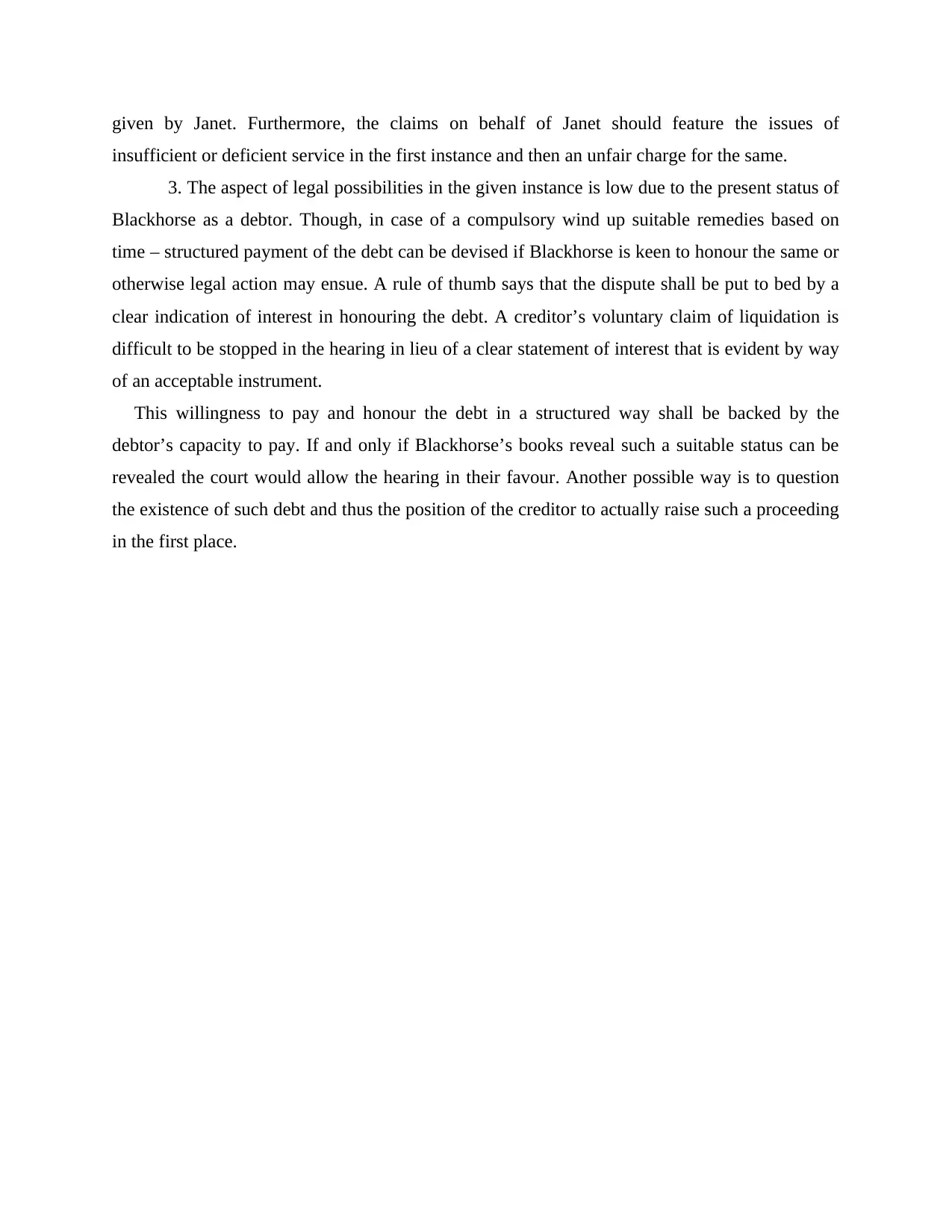
given by Janet. Furthermore, the claims on behalf of Janet should feature the issues of
insufficient or deficient service in the first instance and then an unfair charge for the same.
3. The aspect of legal possibilities in the given instance is low due to the present status of
Blackhorse as a debtor. Though, in case of a compulsory wind up suitable remedies based on
time – structured payment of the debt can be devised if Blackhorse is keen to honour the same or
otherwise legal action may ensue. A rule of thumb says that the dispute shall be put to bed by a
clear indication of interest in honouring the debt. A creditor’s voluntary claim of liquidation is
difficult to be stopped in the hearing in lieu of a clear statement of interest that is evident by way
of an acceptable instrument.
This willingness to pay and honour the debt in a structured way shall be backed by the
debtor’s capacity to pay. If and only if Blackhorse’s books reveal such a suitable status can be
revealed the court would allow the hearing in their favour. Another possible way is to question
the existence of such debt and thus the position of the creditor to actually raise such a proceeding
in the first place.
insufficient or deficient service in the first instance and then an unfair charge for the same.
3. The aspect of legal possibilities in the given instance is low due to the present status of
Blackhorse as a debtor. Though, in case of a compulsory wind up suitable remedies based on
time – structured payment of the debt can be devised if Blackhorse is keen to honour the same or
otherwise legal action may ensue. A rule of thumb says that the dispute shall be put to bed by a
clear indication of interest in honouring the debt. A creditor’s voluntary claim of liquidation is
difficult to be stopped in the hearing in lieu of a clear statement of interest that is evident by way
of an acceptable instrument.
This willingness to pay and honour the debt in a structured way shall be backed by the
debtor’s capacity to pay. If and only if Blackhorse’s books reveal such a suitable status can be
revealed the court would allow the hearing in their favour. Another possible way is to question
the existence of such debt and thus the position of the creditor to actually raise such a proceeding
in the first place.
⊘ This is a preview!⊘
Do you want full access?
Subscribe today to unlock all pages.

Trusted by 1+ million students worldwide
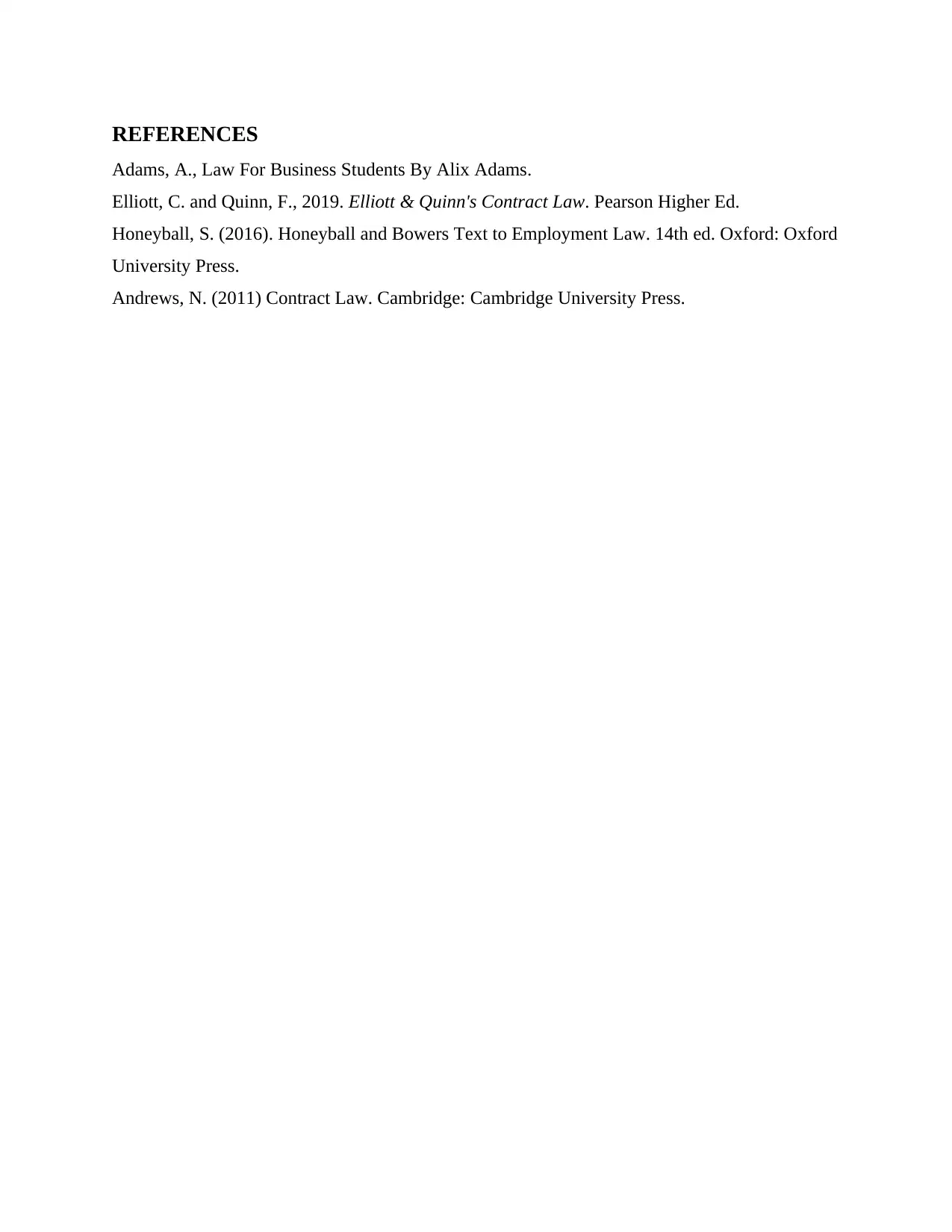
REFERENCES
Adams, A., Law For Business Students By Alix Adams.
Elliott, C. and Quinn, F., 2019. Elliott & Quinn's Contract Law. Pearson Higher Ed.
Honeyball, S. (2016). Honeyball and Bowers Text to Employment Law. 14th ed. Oxford: Oxford
University Press.
Andrews, N. (2011) Contract Law. Cambridge: Cambridge University Press.
Adams, A., Law For Business Students By Alix Adams.
Elliott, C. and Quinn, F., 2019. Elliott & Quinn's Contract Law. Pearson Higher Ed.
Honeyball, S. (2016). Honeyball and Bowers Text to Employment Law. 14th ed. Oxford: Oxford
University Press.
Andrews, N. (2011) Contract Law. Cambridge: Cambridge University Press.
1 out of 10
Related Documents
Your All-in-One AI-Powered Toolkit for Academic Success.
+13062052269
info@desklib.com
Available 24*7 on WhatsApp / Email
![[object Object]](/_next/static/media/star-bottom.7253800d.svg)
Unlock your academic potential
Copyright © 2020–2025 A2Z Services. All Rights Reserved. Developed and managed by ZUCOL.




